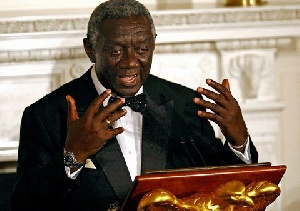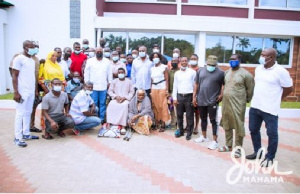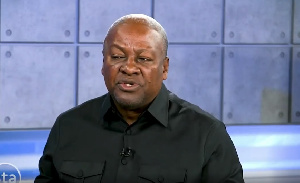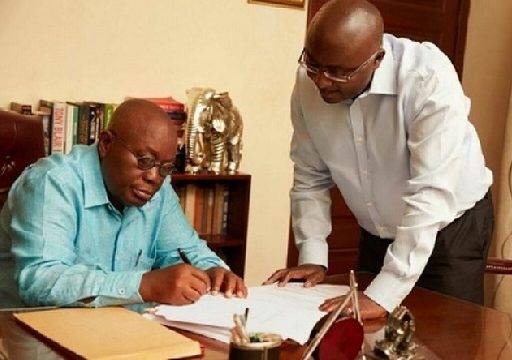Afenyo-Markin breaks silence on Dr Wereko-Brobbey’s accusations of his tenure as ECG Board Chair
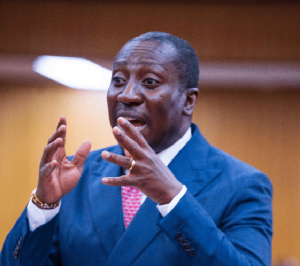
In a statement issued on July 6, 2025, Afenyo-Markin described Dr Wereko-Brobbey’s comments as “misleading, inaccurate, and regrettable.”
He has thus called for national dialogue on structural reforms in the energy sector rather than partisan blame games.
He explained that he was not ECG Board Chairman in 2023 as claimed by Dr Wereko-Brobbey but rather he was appointed on July 16, 2024, and officially sworn in the following day and his tenure lasted approximately six months, ending in January 2025.
“It is, therefore, misleading and factually inaccurate to attribute ECG’s financial challenges in 2023 or early 2024 to my leadership,” he said.
Highlighting his contributions during his brief tenure, Afenyo-Markin revealed that one of his first actions as Board Chair was to overhaul ECG’s procurement and contract management processes, which he described as outdated and vulnerable to abuse.
The previous system allowed vendors to submit Bills of Lading without proper verification of goods. He introduced a new policy ensuring that payments were made only after the confirmed delivery of items to ECG’s facilities, a move he said saved the company significant costs.
In addition, he led efforts to intensify the implementation of the Loss Reduction Programme, initially introduced under the administration of former President Nana Addo Dankwa Akufo-Addo by pushing for the replacement of obsolete meters and the expansion of prepaid metering systems to enhance revenue collection and reduce inefficiencies.
Afenyo-Markin emphasised that his approach was never to push for tariff increases or new levies but to advocate for internal reforms that would reduce waste and improve operational efficiency.
“I have consistently argued that the problems facing ECG are rooted in systemic inefficiencies, not revenue shortfalls. Tariffs, when necessary, must be justified by efficiency gains, not used to cover mismanagement,” he asserted.
He also criticized the recent introduction of a 1-cedi Energy Sector Levy on petroleum products and the successive electricity tariff increases,14.75% in May 2025 and 2.45% in July 2025 by the current National Democratic Congress (NDC) government, bringing the total increase to 17.2% in just six months.
Afenyo-Markin stressed the need for a broader, non-partisan approach to address the deep-rooted challenges of ECG and the energy sector.
He pointed out that during his time as Board Chair, reports showed that less than 30% of electricity consumers actually paid for the power they used, with losses arising from illegal connections, faulty meters, and poor billing systems.
“No amount of tariff hikes or new levies will resolve these challenges unless we address the inefficiencies at their core,” he maintained.
Read the full statement below:
STATEMENT IN RESPONSE TO DR. CHARLES WEREKO‑BROBBEY’S COMMENTS ON MY TENURE AS ECG BOARD CHAIR
My attention has been drawn to remarks by Dr. Charles Wereko-Brobbey, a former Chief Executive Officer of the Volta River Authority (VRA), during an interview on the TV3 network. In his commentary concerning the performance of the Electricity Company of Ghana (ECG) and the energy sector, Dr. Wereko-Brobbey sought to—quite regrettably—implicate my leadership at ECG. While I welcome constructive scrutiny and fully respect his rights to express his views, I find it necessary to correct several factual inaccuracies and clarify the misleading claims he made.
First, it must be clearly stated that I was not the Chairman of the ECG Board in 2023, as Dr. Wereko-Brobbey suggested. I was appointed by His Excellency President Nana Addo Dankwa Akufo-Addo on 16th July 2024, and officially sworn in as Board Chairman of ECG on 17th July 2024.
The first board meeting I presided over was on 31st July, 2024, and my tenure lasted approximately six months, ending in January 2025. As such, any attempt to link my leadership to events or decisions prior to that time—or to attribute ECG’s financial challenges in 2023 or early 2024 to my leadership—is misleading. Dr. Wereko-Brobbey’s claim that I must account for ECG’s “huge losses” in 2023 and 2024 is therefore, respectfully, misleading, unsupported, and factually inaccurate. Since assuming the role of Board Chairman, I led several reforms aimed at streamlining ECG’s operations and reducing losses.
At my very first board meeting, as the minutes would reflect, I led the Board to implement a major policy shift in ECG’s approach to procurement and contract management. For years, ECG operated under a system where vendors delivering items to the ports would hand over the Bill of Lading to ECG without rigorous tracking or validation of the items. This resulted in lapses in oversight, exposing ECG to substantial financial risk.
I immediately abolished this outdated model and replaced it with a transparent, accountable procurement system where payment is made only after verified delivery of goods at ECG’s own facilities. This reform saved the Company significant costs and was a key part of my broader strategy for restructuring and accountability.
Secondly, I directed Management to vigorously pursue the Loss Reduction Programme introduced by former President Nana Addo Dankwa Akufo-Addo. This initiative was aimed at tackling the systemic revenue losses plaguing ECG—particularly those arising from obsolete and malfunctioning meters. Many of ECG’s installed meters had expired, leading to widespread inaccuracies and inefficiencies in billing. In addition, many communities were still without prepaid metering systems.
As Board Chair, I prioritised the modernisation of ECG’s metering infrastructure, expanding prepaid metering coverage and closing the loopholes that enabled non-technical losses. These were interventions designed to improve revenue efficiency.
It is also worth noting that during my tenure, Independent Power Producers (IPPs) received the highest cumulative payments in recent years. These were all part of my broader vision to tackle the systemic structural inefficiencies at ECG—a vision that was fully endorsed by former President Akufo-Addo.
Let me reiterate that my approach to reforms at ECG has never been anchored in tariff increments or new levies. I have consistently advocated for responsible cost-saving reforms rather than burdening the Ghanaian consumer with new taxes and levies. The solution lies in bold, non-partisan structural reforms that cut waste, seal revenue leakages, and streamline operations.
Those are the sustainable solutions to the energy sector’s problems. Tariffs, when necessary, must be justified by efficiency, not imposed to cover mismanagement. That is why I have publicly opposed the recent 1 cedi Energy Sector Levy per litre of petroleum at the pump, arguing that ECG’s problems are rooted in **systemic inefficiencies, not revenue shortfalls.
Again, that is why I have criticised the recent tariff adjustments under the current NDC administration—first, the 14.75% electricity tariff increase on 3rd May 2025, followed by a 2.45% increase effective 1st July 2025—resulting in a total increment of 17.2% in just six months.
It is instructive to note that during my tenure as ECG Board Chair, I was presented with reports showing that less than 30% of consumers pay for electricity consumed, with the rest lost to inefficiencies, illegal connections, and poor billing systems.
It is therefore misguided to resort to frequent tariff hikes or new levies without fixing these deep-rooted inefficiencies. These are the real inefficiencies we must address. Without meaningful reforms, no amount of revenue generation through levies will resolve the challenges ECG faces.
This is why I find it disingenuous for anyone to ignore these efforts and instead seek to distort the facts for political effect. I am on record—both within and outside Parliament—advocating that the way forward for ECG is through national dialogue on structural reforms, not partisan blame games.
Having laid these facts, I acknowledge the important reforms my predecessors initiated—especially in digitising ECG’s revenue collection systems and introducing the early phases of the Loss Reduction Programme. My role was to build on their work, which I did to the best of my ability within my brief tenure.
And so, to Dr. Wereko-Brobbey: I welcome dissenting views, but same must be grounded in verifiable facts. Your comments are unfortunate and do not reflect the spirit of constructive national discourse. If you possess evidence to substantiate your claims, I challenge you to present it publicly. Until then, I will remain focused on advocating for non-partisan reforms at ECG that deliver value to the Ghanaian people through improved service delivery and greater efficiency in the energy sector.
-END-
Signed
Osahen Alexander Kwamena Afenyo-Markin

